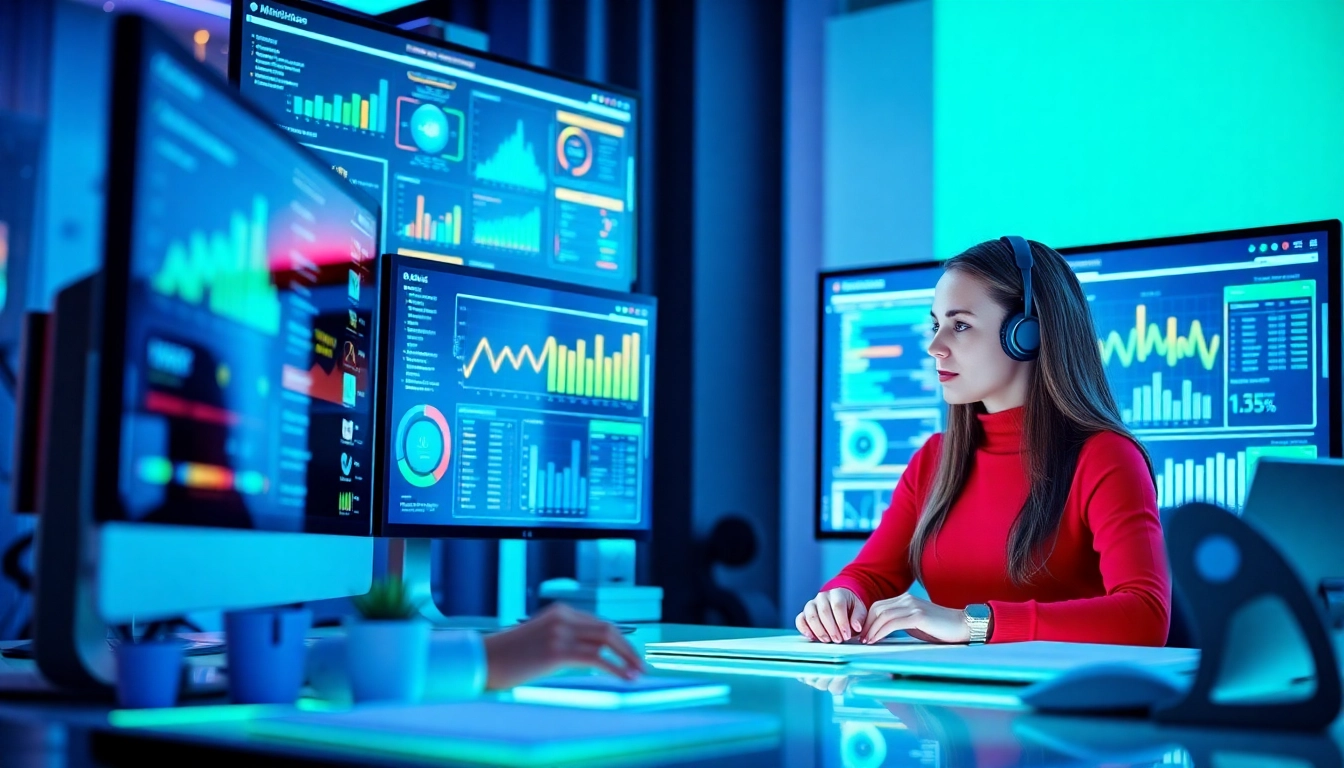Understanding AI Marketing Agents
What Are AI Marketing Agents?
AI marketing agents are software tools designed to automate various marketing tasks using artificial intelligence. These agents leverage advanced algorithms, machine learning, and data analytics to perform tasks such as customer segmentation, personalized content delivery, campaign optimization, and much more. While they require human oversight for most operations, many of them can execute specific tasks with a degree of autonomy, making them valuable assets for marketers looking to enhance efficiency and effectiveness.
In the evolving marketing landscape, the integration of AI marketing agents is becoming increasingly vital. Brands are utilizing these tools to create personalized experiences while saving time and reducing operational costs. This automated approach not only streamlines workflows but also helps businesses maintain a competitive edge in their respective industries. For comprehensive insights on the subject, consider exploring the role of AI marketing agents in transforming business strategies.
How AI Marketing Agents Work
The functionality of AI marketing agents can be best understood through their underlying technologies, such as natural language processing (NLP), machine learning (ML), and data mining techniques. Here’s how they typically work:
- Data Acquisition: AI marketing agents gather data from various sources, including social media, customer databases, websites, and email interactions.
- Analysis: They analyze this data using ML algorithms to identify patterns, preferences, and behaviors that can influence marketing strategies.
- Automation: Based on their analysis, these agents can automate several marketing tasks, such as email marketing campaigns, social media posts, and customer engagement activities.
- Feedback Loop: They can continuously learn and adapt from new data inputs, thus improving their performance over time.
Benefits of Using AI Marketing Agents
The implementation of AI marketing agents presents numerous benefits:
- Increased Efficiency: AI agents can perform tasks faster than humans, allowing marketing teams to focus on strategy and creativity.
- Enhanced Accuracy: By analyzing vast amounts of data, these agents provide precise insights, improving decision-making.
- Cost Savings: Automating routine tasks can significantly reduce labor costs, making it easier for businesses to allocate resources elsewhere.
- Personalization: AI agents can tailor marketing messages based on individual customer needs and preferences, leading to improved engagement rates.
- 24/7 Operations: Unlike human employees, AI agents operate round the clock, ensuring marketing efforts run continuously.
Key Features of Leading AI Marketing Agents
Task Automation Capabilities
One of the standout features of AI marketing agents is their powerful task automation capabilities. This includes:
- Email Campaign Automation: AI agents can automate email marketing campaigns, optimizing send times and customization for better user engagement.
- Social Media Management: Many AI tools can schedule, analyze, and create social media posts, managing engagements across different platforms.
- Customer Service Automation: AI chatbots and virtual assistants can handle customer inquiries in real-time, providing immediate responses to frequently asked questions.
Data Analysis and Insights Generation
Data analysis is at the core of any successful marketing strategy, and AI marketing agents excel in this area:
- Predictive Analytics: AI agents can predict future customer behavior based on historical data, enabling marketers to craft pre-emptive strategies.
- Segmentation: Advanced algorithms allow for intricate customer segmentations that enhance targeting and personalized messaging.
- Real-time Reporting: Many agents provide real-time insights and reports, helping businesses make data-driven decisions swiftly.
Personalization and Customer Engagement
Personalization is a crucial aspect of modern marketing, and AI marketing agents help achieve this in several ways:
- Dynamic Content Creation: AI can generate customized content based on individual user data, enhancing engagement and relevance.
- Behavioral Targeting: These agents track user interactions and tailor messages that resonate with specific audiences.
- Enhanced Customer Journeys: By analyzing user paths, AI can help design better customer journeys that lead to higher conversion rates.
Choosing the Right AI Marketing Agent for Your Business
Evaluating Your Business Needs
Before selecting an AI marketing agent, it is vital to evaluate your business’s unique needs:
- Identify Objectives: Determine what goals you aim to achieve with AI—be it improved customer engagement, better targeting, or increased sales.
- Assess Current Processes: Look at current marketing practices and identify areas where AI can enhance operational efficiency.
- Budget Consideration: Review how much you are willing to invest in AI solutions. Consider both upfront and ongoing costs associated with software deployment and maintenance.
Comparing Popular AI Marketing Agents
When choosing an AI marketing agent, it helps to compare options based on features, ease of use, and integrations:
- ZBrain AI Agents: Known for its deep learning capabilities, ZBrain offers solutions tailored to customer behavior prediction.
- Botpress: A user-friendly platform, Botpress excels in building powerful chatbots that improve customer interaction.
- Relevance AI Agents: Provides advanced features for data-driven marketing decisions while simplifying processes.
Features to Look For
Here are essential features to prioritize when selecting an AI marketing agent:
- Integration Ease: Ensure the agent can easily integrate into your existing systems and tools.
- User-Friendly Interface: A simple and intuitive design helps teams adopt the technology quickly.
- Robust Analytics: Look for powerful analytical capabilities to drive insights and strategies based on real-time data.
- Customer Support: Reliable customer service can make a significant difference in your experience with the platform.
Integrating AI Marketing Agents Into Your Strategy
Implementation Steps for Success
Successfully integrating AI marketing agents requires a strategic approach. Here are the steps to consider:
- Define Goals: Clearly outline the objectives you wish to achieve with AI integration.
- Choose the Right Agent: Use your evaluation criteria to select an agent that aligns with your requirements.
- Train Your Team: Provide adequate training for your marketing team to maximize the potential of the AI tools.
- Monitor and Optimize: Regularly review performance and make necessary adjustments to enhance outcomes.
Measuring Performance and ROI
To gauge the success of your AI marketing efforts, focus on key performance metrics:
- Conversion Rates: Track how many leads are turning into customers as a direct result of AI initiatives.
- Engagement Metrics: Monitor user interactions with personalized content and campaigns to assess effectiveness.
- Cost Efficiency: Calculate cost savings attributed to automation versus previous marketing strategies.
- Customer Satisfaction: Utilize surveys and feedback loops to understand customer satisfaction and experience.
Common Challenges and How to Overcome Them
Integrating AI marketing agents comes with challenges, including:
- Resistance to Change: Employees may be reluctant to adopt AI solutions. Offering training and highlighting success stories can help ease this transition.
- Data Quality Issues: Poor data quality can hinder AI performance. Implement regular data cleansing processes to improve accuracy.
- Integration Difficulties: Ensure you choose an AI solution that fits well with your existing technologies. Leverage specialist assistance, if needed.
Future Trends in AI Marketing Agents
The Evolving Role of AI in Marketing
As technology advances, the role of AI in marketing is continuously evolving. Future trends may include:
- Increased Personalization: The ability to provide hyper-personalized content will become further refined as data collection methods improve.
- Integration of Augmented Reality: Expect AI to work alongside AR technologies for immersive customer experiences.
- Voice and Visual Search Optimization: AI agents will enhance marketing strategies that incorporate voice and image recognition capabilities.
Predictions for AI Marketing Agents’ Development
Looking ahead, many predict the following developments:
- Greater Autonomy: AI agents will become increasingly autonomous, handling more complex tasks without human intervention.
- Innovative Analytics: Advanced analytical capabilities will offer deeper insights into consumer behavior and emerging trends.
- Cognitive Capabilities: Future AI marketing agents are expected to adopt cognitive functionalities, allowing them to think and reason more like humans.
How to Stay Ahead in AI-Driven Marketing
To effectively navigate the AI-driven marketing landscape, businesses should:
- Invest in Continuous Learning: Ensure that your marketing team stays updated on the latest AI trends and tools.
- Experiment with New Technologies: Be willing to test new AI tools and strategies to find what works best for your organization.
- Adopt a Data-Driven Culture: Cultivating a data-centric approach will enable your team to make informed decisions and track performance metrics effectively.



